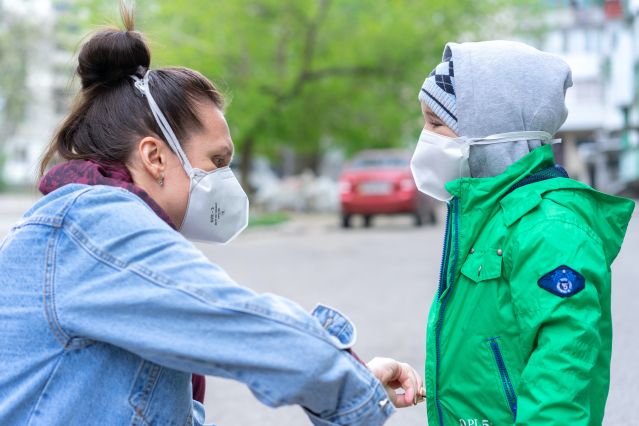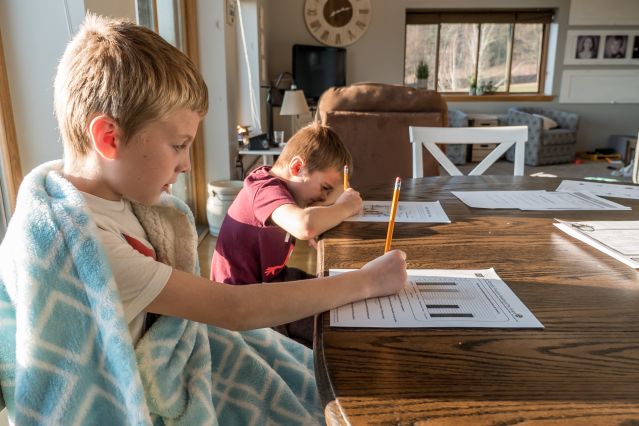Depression
How COVID-19 Homeschooling Affected Parents' Mental Health
A study looked at couples' anxiety, depression, substance misuse, and coping.
Posted April 7, 2023 Reviewed by Devon Frye
Key points
- Homeschooling parents experienced increased depression and anxiety during COVID-19 lockdowns, compared to childless couples.
- Homeschooling parents experienced increased conflict in their romantic relationships.
- Homeschooling parents experienced increased pandemic-specific stress and often resorted to alcohol and cannabis to cope.

Think back to March 2020—almost overnight, our lives turned upside down. The COVID-19 pandemic quickly spread, and the effects of the lockdowns followed.
Many parents once responsible for simply dropping off their kids at school now had to take on the roles of both parent and teacher, at least in part. From providing around-the-clock childcare to, in some cases, teaching children with different needs and grade levels, many parents had a whole new task on their plates: homeschooling.
When schools closed, the level of support offered by the school system varied widely across Canada, the country in which I live. Some children had a full day of online classes; some had a few hours of teaching and then "homework" to do on their own; and some were merely given a week's worth of material to cover at their own discretion.
No matter the method, many parents were left wrangling kids in front of a computer, making sure they stayed there, and often answering questions along the way. This was a true challenge because parents were already facing their own transitions to work from home and, let's face it, a computer screen doesn't offer the same kinds of stimulation a real classroom does.
Effects of COVID-19 Mandatory Homeschooling on Parenting, Relationships, and Mental Health
This unprecedented event led my colleagues and me to wonder: How did mandatory homeschooling affect Canadian couples’ mental health during COVID-19 lockdowns?
So, we conducted a study to answer this question. We compared the anxiety, depression, alcohol misuse, cannabis misuse, and coping mechanisms of couples with children in grades 1-12, whom they homeschooled, vs. couples without children during the COVID-19 pandemic. Here’s what we found:
1. Homeschooling was associated with increased depression and anxiety.
The more time parents spent homeschooling, the more anxiety and depression they experienced.
Overall, research shows adults with children experienced poorer mental health during lockdowns than those without. Our research indicates that this is likely correlated with the stress and demands of mandatory homeschooling.
2. Homeschooling was linked to increased COVID-19-specific stress.
On top of increased depression and anxiety, COVID-19–specific distress, such as socioeconomic struggles and traumatic stress, also went up the longer parents spent homeschooling their children. Adults were required to spend more time and energy parenting while navigating increased financial pressure and fear around current events. On top of it all, many parents didn’t have access to childcare or other resources they once relied on for support.
3. Homeschooling parents reported lower optimism.
Homeschooling couples also experienced lower optimism than those without kids. Constant exposure to stress can wear us down, leading us down a path of pessimism and depression.
4. Homeschooling parents reported using alcohol and cannabis more to cope with stress.
Adults often turn to substances like alcohol and cannabis during times of stress—and the pandemic and lockdowns created constant parenting stress for many. Our research found that homeschooling couples reported higher levels of coping with alcohol and cannabis for their increased anxiety, depression, and COVID-19-related stress.
5. One parent's homeschooling was correlated with the other partner's increased alcohol use.
Homeschooling likely affected more than parenting—it appeared to affect relationships, too. The more time a parent spent homeschooling, the more they reported that their partner turned to alcohol as a coping mechanism. These changes in parenting and family dynamics greatly affected relationships and individuals’ mental health.

Support and Relief for Parenting and Post-Pandemic Stress
Even with lockdowns lifted, the effects of the pandemic still impact our families, relationships, and parenting experiences today. We’re still struggling to figure out what the “new normal” is, but at least we now know that there is light at the end of the tunnel. Schools are open again, as are restaurants, theatres, stores, and other activities where we can spend time with friends and blow off steam.
What can stressed-out parents do? Take pride in knowing that you are resilient and coped during a global crisis. Take time to appreciate the things you missed when you were homebound, including your social circle and the world outdoors. And, if things still seem bleak, take care of yourself and reach out for help if you need it—therapy can help.
References
Deacon, S. H., Rodriguez, L. M., Elgendi, M., King, F. E., Nogueira-Arjona, R., Sherry, S. B., & Stewart, S. H. (2021). Parenting through a pandemic: Mental health and substance use consequences of mandated homeschooling. Couple and Family Psychology: Research and Practice, 10(4), 281–293. https://doi.org/10.1037/cfp0000171




